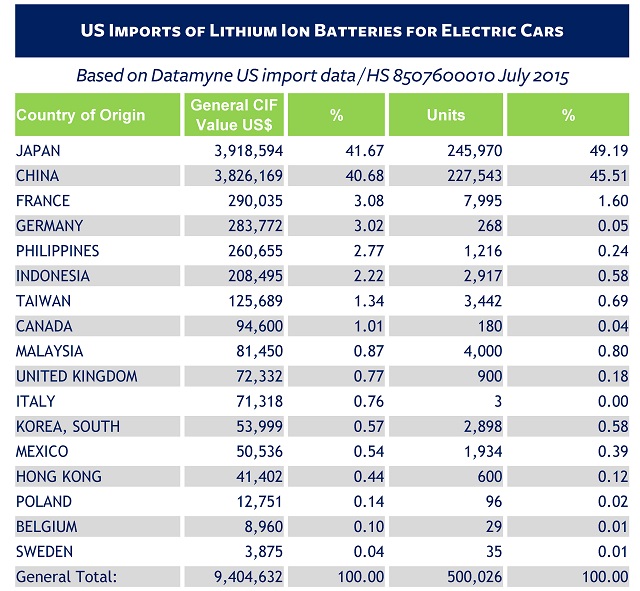Yet another sign that electric cars are catching on: A new 10-digit Harmonized Tariff System code has been established for the lithium-ion batteries used to power electrical vehicles: HS 8507.60.0010. Until now, the HS codes did not distinguish between EV batteries and Li-Ion batteries used in consumer electronic devices and power tools.
The code became effective in July – and July’s US trade data, the first to capture imports of EV-purposed Li-Ion batteries, was released earlier this month:
The trade data captured by the new HS code for Tesla and other EV makers fits with other information pieced together by market watchers.
For instance, top battery seller* is Japan’s Panasonic, supplier to Tesla, the EV sales leader. China’s AESC [Automotive Energy Supply Corp.] is second-ranked. AESC is a joint venture of Renault and Nissan – the latter’s Leaf currently ranks second in sales (note, though, that Nissan sources batteries for the US Leaf from its plant in Tennessee).
We’ll be watching for an increase in imports from South Korea as its top Li-Ion battery makers, LG Chem and Samsung, compete for share. Recent reports (here, for instance) are that Nissan is considering sourcing it next-generation batteries from LG Chem. Meanwhile, Panasonic’s lead may be vulnerable to its dependence on Tesla, which is building a gigafactory to manufacture batteries in Nevada.
*Note that both the battery makers’ sales rankings and EV sales rankings are from EVObsession.
Ironically, the electric vehicles these Li-Ion batteries power are yet to be given their own HS code. EVs are covered by the all-purpose “Motor Vehicles – Other” code of HS 8703.90.00. The World Customs Organization has proposed a separate code for EVs as part of the next round of HS revisions in 2017. Look for the US to adopt the revised codes – and for more precise data on trade in EVs – a year earlier, in 2016.
Related:




